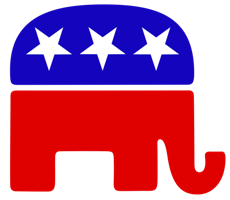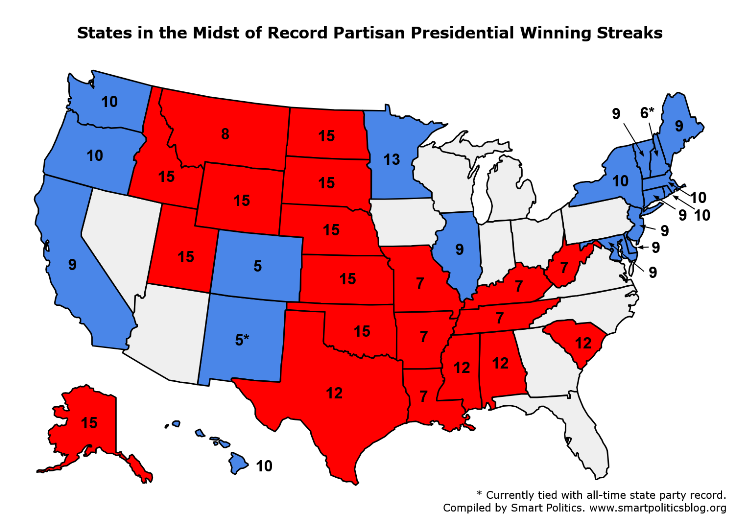38 States in the Midst of Record GOP or Democratic Presidential Winning Streaks
More than three-quarters of states saw one of the two major parties extend, set, or tie party records in elections to the White House this cycle
 With only a handful of battleground states providing any drama in recent election cycles, the 2024 matchup between Donald Trump and Kamala Harris saw the extension of record-setting partisan performances by Democrats and Republicans in a supermajority of states across the nation.
With only a handful of battleground states providing any drama in recent election cycles, the 2024 matchup between Donald Trump and Kamala Harris saw the extension of record-setting partisan performances by Democrats and Republicans in a supermajority of states across the nation.
Overall, 38 states extended, set, or tied a partisan winning streak in elections to the White House.
One state saw a new party record set:
- Illinois Democrats won their ninth straight election for president. The party had previously won eight in a row from 1828 to 1856.
Democrats also tied their best streak ever in two states:
- Kamala Harris carried New Hampshire for the sixth straight cycle for her party, matching the Democratic streak from 1832 through 1852.
- New Mexico Democrats saw their party’s nominee win for a fifth consecutive election, equaling their streak from 1932 through 1948.
Meanwhile, Democrats and Republicans in 35 states extended all-time party records already held heading into Election Day.
On the Republican side:
- Nine states notched their 15th consecutive GOP presidential win dating back to Richard Nixon’s victory in 1968: Alaska, Idaho, Kansas, Nebraska, North Dakota, Oklahoma, South Dakota, Utah, and Wyoming.
- Four states extended their GOP winning streaks to 12 in a row since 1980: Alabama, Mississippi, South Carolina, and Texas.
- Montana’s GOP streak increased to eight straight elections since 1996.
- Six states boosted their Republican winning streak to seven in a row since 2000: Arkansas, Kentucky, Louisiana, Missouri, Tennessee, and West Virginia.
The aforementioned nine states broke a tie with seven others for the second longest GOP winning streak in party history. [Iowa, Maine, Massachusetts, Michigan, New Hampshire, Ohio, and Rhode Island also rattled off 14 wins in a row from 1856-1908]. Vermont holds the all-time party record of 27 straight Republican victories set from 1856-1960.
On the Democratic side:
- Minnesota extended its best-outside-the-South party record of 13 consecutive victories since 1976. Minnesota is currently tied for the eighth longest Democratic winning streak in party history along with North Carolina (1876-1924) and Virginia (1876-1924).
- Harris also continued record party streaks for a 10th straight cycle in six states dating back to 1988: Hawaii, Massachusetts, New York, Oregon, Rhode Island, and Washington.
- Seven states won a party best nine consecutive elections since 1992: California, Connecticut, Delaware, Maine, Maryland, New Jersey, and Vermont.
- Colorado also increased its Democratic record to five elections in a row since 2008.
All told, Republicans are currently in the midst of all-time state party records in 20 states with Democrats owning 18 in their column [plus the District of Columbia, which has never backed a GOP nominee for the office].
Looking ahead to 2028, one more state could be added to this list: a Republican victory in Florida would tie a party record with their fourth straight cycle of carrying the state.
Follow Smart Politics on X/Twitter.


– Hm…at least there shall be no commission that purportedly would investigate ‘massive’ fraudulent voting, like the one following the 2016 election, which produced a divergent result of the nonbinding popular vote and the binding Electoral College vote! (As well…no loud calls from detractors of the Electoral College, since a nationwide popular vote would have produced the same result.
– Since the MAGA/R ticket won ‘well over’ the required 270 votes, the Omaha-centred EC vote will highly likely be preserved; had the grievances-filled ticket lost by a wafer-thin 268 to 270 votes the de facto MAGA-dominated Unicameral would assuredly have taken the vengeful step of abolishing the *district allocation electoral system*.
{Miscellany}
– By my count, DFLer “Tim” Walz would be only the third person to bid for a third full term as governor (“Tim” Pawlenty in 2018 and fellow DFLer Rudy Perpich in 1990 being the others) since the term of the post has been lengthened some decades ago. Midterm elections almost always being advantageous for the party out of presidential power, the very recent D vice presidential contender would be at least a slight favorite should he opt to, though the stunning loss of control of the state house (lower chamber) might prompt him to stand down.
– With the stunning yet unsurprising defeat of its *senior occupant* (18 years) and the impending resignation of its *junior occupant* (2 full years, as of the Third of 01 2025, resulting in the instant loss of up to 2 decades of seniority), the Buckeye State will have *two new* US senators, sometime before Monday 20 of 01 ’25. The most recent period for such rapid changeover was in the wake of the 1974 and 1976 elections (When did the state have such nearly simultaneous change to its delegation prior to *that period* ?).
(Happy Remembrance Day – for some – and Veterans Day for many more readers of this blog; yes, this day will be part of the extended weekend, which will likely be an occasion for celebration for 51% or so of the US – and sober reflection for at least 47% thereof.)
Wait … so Alaska, Idaho, Kansas, Nebraska, North Dakota, Oklahoma, South Dakota, Utah, and Wyoming voted for Biden in 2020? You sure about that?
One-third of Nebraska did – the metropolitan CD-02.
[…] 38 States in the Midst of Record GOP or Democratic Presidential Winning Streaks […]
– The most recent R president to have died during a Democratic presidency was Nixon in 1994 (first term of Clinton).
– The most recent D president to have died during a Republican presidency was “Landslide Lyndon” in 1973 (less than a week into second, shortened term of Nixon).
[Considering the result of the ’24 election, President Carter managed to pass away during a ‘favorable’ period – indeed barely!
As well, Carter is the third consecutive president – current or former – to have died during the ‘holiday season’ – Holloween to New Year’s – following Ford in 26 of 12 ’06 and Bush “41” in 30 of 11 ’18.]
[…] out of the 2024 election, Smart Politics published articles documenting how 38 states are in the midst of record major party winning streaks in presidential elections, how the 119th Congress set the record for the fewest split U.S. Senate delegations, and how the […]
[…] Congress setting a record for the lowest number of split U.S. Senate delegations, the number of single-party state congressional delegations reaching a 70+ year high, and the Democratic and Republican parties currently owning record presidential winning streaks in […]
[…] states. Previous reports focused on Democratic and Republican parties currently owning record presidential winning streaks in 38 states and U.S. Senate winning streaks in 27 states, the rise of single party U.S. House delegations, the […]
[…] the rise of single party U.S. House delegations, Democratic and Republican parties currently owning record presidential winning streaks in 38 states, the 119th Congress setting a record for the lowest number of split U.S. Senate delegations, and […]